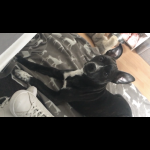Hello,
I am a bit old fashioned. But after 30 years of puppies I still like science diet puppy. No boutique grain free for me. It’s afforsable accessible and good. My personal professional preference.
Hi pawbly-
If a dog had pneumonia as a puppy, are there residual effects when they are older? I’m curious because one of our dogs, Riva, apparently had pneumonia when they first got her to the rescue. She is 2 now and seems to tire easily. Loves to play and run, but not for too long. Curious if there is a correlation or if she really is just a diva?
Comments
I have an 8 week old Beagle/Labrador mix puppy (Sonny). He is currently on ID because he had diarrhea when I brought him home last weekend. He is “solid” and ready for regular puppy food to be introduced, and I’m at a loss on what to choose. So confused about grain-free debate and ensuring no by products. Please can you give some guidance? Favorites?
Comments
6-month old Golden Retriever/Labrador mix bites me most of the time. She’s usually nice when it’s playtime or feeding time (if she’s overstimulated accidents may or may not happen). But in downtimes she just comes at me. I could be sitting quietly not bothering her and she could be lying down 1 second and the next she’s suddenly biting my arm. It doesn’t often happen to other family members. Is it because she wasn’t taught bite inhibition properly because family members don’t want to leave the room or do it nicely? Is it because they react aggressively when she bites them (i.e. they used to pinch her and step on her paw. now it’s mostly just pinning her down to the floor)?
I’m honestly tired. They think they’re doing it right, but I don’t think it’s working. But since she’s not biting them as much they think of it as working.
I’m literally the only one playing and exercising her and I think that factors in a lot. They just leave her and aside from feeding her in the morning, they really don’t do anything else.
I got a response from another site a few months back and they said I had a people problem, not a puppy problem. Is there anything I can do though? Is it something that’s wrong with me?? I don’t know anymore please help :(((((((((((
Comments
-
Natisha Mullis-Brooks You do have a “people problem”, but that “people problem” has now caused a dog problem. It sounds like the pup is bored and wanting to play, but hasn’t been taught the social niceties of the “human world”. Retrievers are very mouthy in general because that’s what they’re bred for; picking up and carrying things. But there are actually several things you can do to help.
First things first: If she comes at you and bites down on your arm, yell out, “Ow!”, in a loud and high pitched voice. As hard as it might be to do, try not to pull your arm back as this may trigger the tugging instinct. Even at six months old, she can be taught bite inhibition. It’s not too late!! Yelling out in a high pitched, loud voice may startle her into letting go. After all, her goal is not to hurt you, but to play and get some attention. Think of puppies when they play. When one yells in pain, the other usually lets go. That’s our goal here. If she does let go, offer her a toy that the two of you can interact with: a rope for tug, a squeaker for catching, a ball for chasing. Make sure, when you are with her, you have a toy that she likes with you at all times. Because once she lets go, you want to say, “Good girl!” and give her the toy immediately and then a bit of affection for doing the right thing. Most retrievers have high drives and love a game of fetch.
If the yelling doesn’t work, you can yell “Aaaanntt” and push your arm firmly into her mouth. This losens her grib by widening her jaws and most dogs don’t like how it feels. As soon as she releases you, say “Good girl” and offer the toy and your time.
If neither of the above works, you may have to try a bit of nose pressure. When she bites down yell “Ow!” and then place your hand (thumb on one side and index finger on the other) over her nose so that the meaty part between your thumb and finger are applying pressure to the top of her nose. You want to place it about a quarter of the way down her nose. Then squeeze your index finger and thumb together as if you’re trying to make them touch through her nose. You’ll have to supply a decent amount of pressure for this to work, but you don’t r ally want to harm her. The top of a dog’s nose is VERY sensitive and a. Other dog will bite a pup here with some force, when the pup has gotten out of hand. You want to mimick a mother’s technique, sans the teeth. Once she releases you,give her the toy and affection. She may yell when you do this, but I promise you are only causing a bit of discomfort and no large amount of pain.
Lastly, if all else fails you’ll have to become a bit more aggressive in your tactics. -sigh- Ehen she bites you, place your thumb behind her upper canine by the same means as applying pressure to the top of the nose, but apply no pressure. Instead, run your thumb down to her upper lip and push it into her mouth a bit. This will cause her to bite down on her own lip (we all nonhow horrible this feels!) and in most cases, she’ll let go of you almost immediately. Give you, “Good girl” and affection immediately. And bonus, she’ll get to experience her own bite strength, which promotes bite inhibition.
I wish you two a lot of luck. If you have any questions about technique, I’d be happy to send you videos. I’m a Canine Behaviorist and have worked with dogs for over 30 years. Just email me at: tishtish1975@yahoo.com
Hello, a couple months ago my home became a multi-dog household, with the newest addition being a now 10 month old GS/lab mix, and our resident dog, a 3 year old beagle/rottie mix, both males. They are both very well behaved and have never fought. However, they were not socialized properly as puppies—or at least we did not adequately socialize our beagle mix when he was a puppy, and GS mix was already 6 months old when we got him and we don’t know if or how his previous owners socialized him.
The results of their poor socialization: resident dog does not seem to recognize playful behavior from new dog and thus becomes uncomfortable, clearly cares for new dog (acts to protect new dog if anyone is playing rough with him) but won’t play with new dog, and seems to sometimes even avoid new dog.
New dog is a little better with socialization, but his main fault is that it seems he doesn’t know how to recognize resident dog’s “corrections” to him and to back off (even if most of the time he simply wants to play with resident dog), and he also has some bullying tendencies, some intentional and others not (wants to play with whoever resident dog is playing with, sometimes bugs resident dog to move if new dog wants to lay down in that spot, etc; though never has shown any physical aggression).
Resident dog is, personally, my dog, and I love him dearly, though I love new dog too, and would love to see them bond and play together, only I don’t know the best course of action to achieve that.
I would greatly appreciate any help with ideas on how to adjust these behaviors of theirs, as well as weigh in on the idea of setting up a doggie-play-date with a friend (with a stable and model dog, of course) so that maybe visitor dog can teach them how they should behave.
Comments
Hello! I have a puppy named Chico, he’s a Japanese Spitz. He’s only 4 months old and he’s a really healthy dog. He eats a lot, he drinks a lot. However since 2 days ago, he hasn’t eaten anything. He doesn’t want to eat anything, he drinks water though. But he really doesn’t want to eat. Whenever we gave him food, after a few hours, he’ll vomit that food that he ate. We think it’s dehydration, but just like what, I’ve said awhile ago, he likes to drink a lot of water so I don’t think that he’s dehydrated. Since 2 days ago, he has lost around 4 pounds I think. We’ve tried giving him electrolyte like Gatorade, we’ve also given him metoclopramide, and dextrose also. But he always vomits his medicine after a few hours also. What should I do? Please help me, he’s really gloomy.
Comments
I have a 9 week old German Shephard puppy that is itching and scratching. Apparently all if them from the litter are. Ive washed him in oatmeal bath for puppies and someone suggested they were allergic to the food (blue buffalo puppy, chicken formula). Ive started to change his food, but I dont know what it could be!??
I have 2 other dogs and they don’t do this.
Comments
16 week Golden Retriever puppy can go all night in her kennel and it is dry but during the day she pees every time I go out. I had a towel in there and I thought maybe she did it because the towel absorbed the dampness. Today I left her for 3 hours with no towel and she wet the kennel. She is still in a small kennel.Any ideas?
Comments
I just got an 8 week old puppy. I just picked him up today and took him to meet my other dogs he started acting aggressive he started growling and snapping at them. How do but an end to this aggressive behaviour before it turns into a problem?
Comments
-
Anonymous I agree with Sarah.
Most likely this is fear, not aggression. He’s been taken from the only home he knows and thrown into a household with strange dogs…anyone, human or animal, would be overstressed. Introductions need to be slow and gradual, with protection of every dog in the situation as your main priority. You really, really need to contact a good trainer who can work with you AND your dogs.
When should a puppy transition from puppy food to adult dog food
Hi so I have a puppy staffy, But not to sure if he is a cross? Can someone help please!! If he is what is he crossed with?












Hello,
I have seen lots and lots of puppies recover from pneumonia and all of them grew up to be normal active healthy dogs. It is (theoretically) possible that the damage to the lung could cause scarring and potentially make exercise (breathing and stamina) more difficult. But, my bet is more on diva. ?